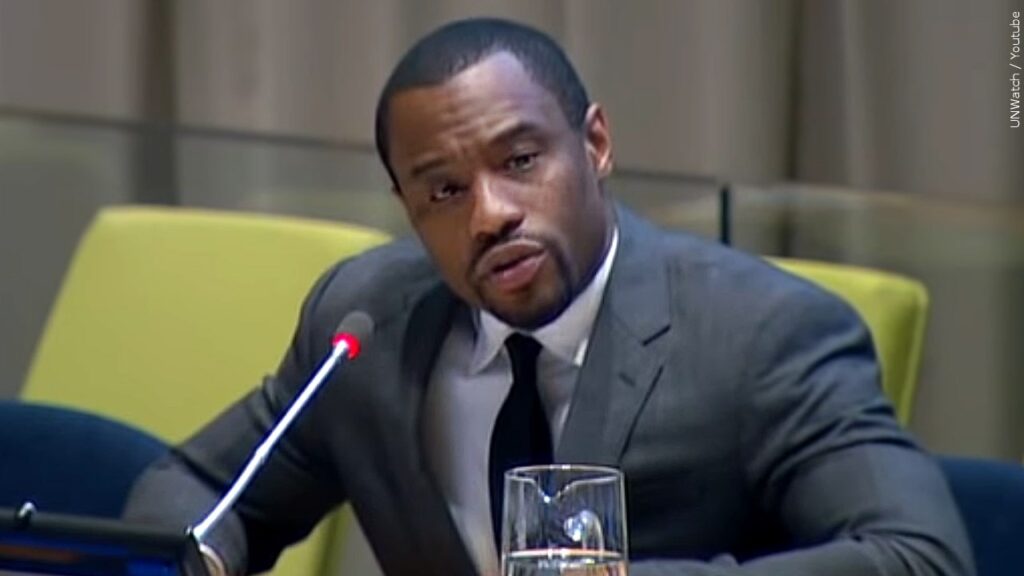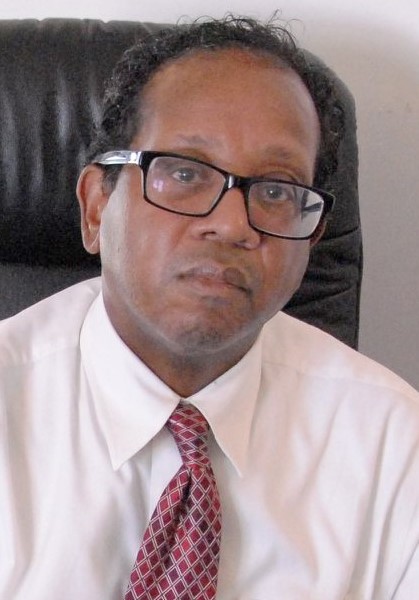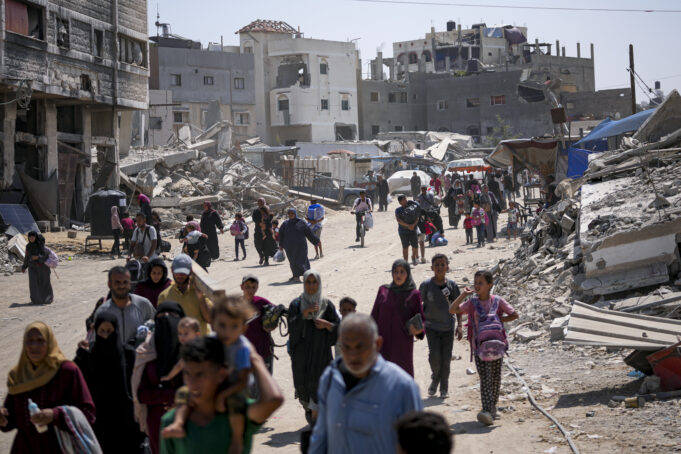Dr. Marc Lamont Hill is one of the leading intellectual voices in the country. He has hosted shows for BET News, The Grio, Al Jazeera, and the Coffee & Books podcast. He now offers information and perspective every evening with “Night School” on YouTube.com. He engaged in an insightful one-hour interview recently with Naba’a Muhammad, editor-in-chief of The Final Call newspaper on Gaza genocide, Israel’s long oppression of the Palestinian people, why Americans should be concerned and significant changes in what he describes as a “longstanding one, but also a righteous” cause.
Dr. Hill has received numerous prestigious journalism awards. He is a professor at the City University of New York Graduate Center. Previously, he held positions at Morehouse College, Temple University, and Columbia University. Ebony Magazine has named him one of America’s 100 most influential Black leaders.
Since his days as a youth in Philadelphia, Marc Lamont Hill has been a social justice activist and organizer. He has worked on campaigns to end the death penalty, abolish prisons, and release numerous political prisoners. Dr. Hill has also worked in solidarity with human rights movements around the world. He is the founder and director of The People’s Education Center in Philadelphia, as well as the owner of Uncle Bobbie’s Coffee & Books.
Dr. Hill holds a Ph.D. (with distinction) from the University of Pennsylvania. His current research and writing explore the relationships between race, culture, politics, and education in the United States and the Middle East. He is a published author and his books are available at www.marclamonthill.com. Follow @marclamonthill on “X,” formerly Twitter, and www.youtube.com/@marclamonthillofficial. Below is the first excerpt from a multi-part interview that has been lightly edited.

Marc Lamont Hil Photo: MGN online

Naba’a Muhammad Photo: Final Call
Naba’a Muhammad (NM): As Salaam Alaikum. I am Naba’a Muhammad, editor-in-chief of The Final Call newspaper. And I have the pleasure today of interviewing Marc Lamont Hill, an educator, entrepreneur, journalist, analyst, author, and activist. Marc, thank you for the interview. Can we begin with you talking a little bit about yourself, what you do and who you are?
Marc Lamont Hill (MLH): Yes, sir. My name is Marc Lamont Hill. I am a professor at the City University of New York Graduate Center (CUNY Graduate Center), and I am now the host of “Night School with Marc Lamont Hill,” which is a nightly YouTube show that I host.
NM: I enjoy the show. I’m actually a subscriber. Many people only became aware of the horrors of the Israeli occupation and the destruction of the Palestinian people last October 7, when Israeli Prime Minister Benjamin Netanyahu initiated a war in Gaza that many have condemned as genocide after an attack by Hamas and others on the Zionist occupying forces. But you have been involved in Palestine and the struggle for justice for some time. Can you talk some about that? How did you get started and what are some of the things you’ve done and seen over the years?
MLH: It’s a great question, my brother. I first became aware of the struggle for justice in Palestine through my reading of what we call the Black Radical Tradition. There’s a long history of Black people, Black freedom fighters—both in the United States and around the globe—who recognized that our liberation is bound up not just in the struggle for justice domestically, but in our ability to recognize and ultimately dismantle the systems of power that subjugate all oppressed people around the globe. So, we can’t get free if South Africa’s not free. South Africa can’t get free if Sudan isn’t free. Sudan can’t get free if Palestine isn’t free. It’s all of us or none of us. And so, specifically, I studied Malcolm X. A lot of people oversimplify Malcolm’s development, political development, as he goes to Mecca in 1964 and sees White Muslims for the first time and loses his mind. But the truth is, as a member of the Nation of Islam and as a representative, as a student of the Honorable Elijah Muhammad, Malcolm first goes to the area we call Palestine in 1959.
It was my studying of Malcolm X that led me to think about the relationship between, again, the liberation struggle here and the liberation struggle of people around the globe.
For me, initially, it was a question of what Muslims, what the ummah looked like, what the Muslim community looked like globally. That we weren’t reducible to who we were in the United States, that there was a Muslim community that was bigger than here. But then it became a question of not just Muslims, but Black and Brown people around the globe. What was our struggle like around the globe?
Malcolm pointed us to that in 1959 and he pointed it even more decisively in 1964 when he writes an essay in the Egyptian Gazette called “On Zionist Logic” in September of 1964, where he begins to break down not perfectly, but still incisively and insightfully, the challenge of the settler colonial project known as Israel. In 1967, SNCC (the Student Nonviolent Coordinating Committee) published a newsletter in the summer of 1967 that responded to the war, the Six Day War, or the 1967 War where they recognized it as a neo-colonial project. Martin Luther King Jr. in his final days in 1968, warned that the Israeli government would never surrender Jerusalem, East Jerusalem, and Dr. King has been dead for 56 years. Jerusalem hasn’t been given back, and so history instructs us that this struggle is a longstanding one, but also a righteous one.
In my own work, I have spent the last decade not only studying this issue, but working in solidarity with our Palestinian sisters and brothers to figure out how we can best be allies to each other in our respective liberation struggles. For me, it means pointing out injustices, it means organizing actions, it means supporting campaigns, and it means engaging in deep, not just study, but deep teaching of these circumstances and sort of offering pathways out, helping to offer pathways to liberation for our respective communities.
NM: What are you seeing happening in Gaza right now? How would you describe or label what’s happening?
MLH: I think the only way we could describe what is happening in Gaza is as a genocide. On October 7, 2023, Hamas attacked Israel. They breached Israel’s borders. What Israel has done in response since October 7 has extended far beyond what could be deemed by any standard as reasonable self-defense. Israel has done more than defend its borders. Israel has done more than eliminate the potential threat of an invader. Israel has launched an unyielding onslaught in the Gaza Strip that has officially killed 38,000 people with another 10,000 people laying under the rubble. They have injured more than 90,000 people. Israel has destroyed every college and university in Gaza. They have destroyed many of the other public schools. They have dismantled more than 75 percent of the physical infrastructure, the built environment of Gaza.
Although the war has been allegedly designed to kill Hamas and terrorists and terrorism, two-thirds of the people killed in this onslaught have been women and children. It would be inconceivable, it would be unimaginable in nearly any other country in the world for this to happen and it not spark international outrage and global intervention. There is no way. If this were to happen in any European country, we would be calling this a crime against humanity.
NM: The Israeli and Jewish groups that support Israel and individuals who back Israel, they typically say or try to frame what is happening now in Gaza—which is genocide—as a response to October 7, 2023. But wasn’t there a history before that event and is that history? …
MLH: That’s the right question to ask. People would have you believe that history began on October 7. If history began on October 7, Israel would be in the right. But before October 7, Israel has waged, as the great historian Rashid Khalidi says, a 100-year war on Palestine. The West would have you believe that Israel left Gaza in 2006 and Palestinians simply made bad political choices.
The truth is, Israel didn’t leave Gaza in the end of 2005 or beginning of 2006. They simply redeployed their troops to the border. Israel has not let go of its effective control, and that word effective is important. If it’s effective control of Gaza, they have always controlled Gaza since 2006. They have controlled Gaza by land, by air, by sea, by electromagnetic sphere, by population registry. They control what goes in and what goes out. They control who goes in and who goes out. So, there is no reasonable or measurable way that Israel has not controlled Gaza at all times. Gaza is not a free Palestinian country. Gaza has been an open-air prison that has kept Palestinians under siege from day one.
And so, when we look at the Gazan response on October 7, it was a response to 17 years, at the time, 17 years of siege. It was also a response, at the time, to 56 years of occupation. If you talk about from 1948, it was also a response from 75 years of apartheid. And, it was a response also to more than 100 years of settler colonialism. So, whatever we think about October 7, we cannot divorce it from October 6, October 5, and every other date preceding October 7 all the way back to when the first wave of European Zionists invaded historic Palestine at the end of the 19th century.
NM: There are two things that I find interesting about this war in Gaza. One, there’s been an unprecedented protest in condemnation of what is happening there in the United States. And two, the Biden administration and some members of Congress are doubling down on their support of pro-Israel groups like the ADL, AIPAC (the American Israel Public Affairs Committee) Zionist groups, and these ardent supporters of Israel. And they are all pressing and moving forward relentlessly with the targeting and efforts to destroy those who oppose or question too deeply what’s happening. What’s going on with these two opposing positions and their activity?
MLH: For a long time, support of Israel was a prerequisite for being a mainstream American politician. It was an unquestioned posture. It was an unquestioned ideology. It was an unquestioned stance that every American politician was presumed to hold that “we stand with Israel,” that “we support Israel’s right to exist,” that “Israel is our most treasured ally.” Even people who advocated for a two-state solution only did so in ways that did not hold Israel to any kind of significant accountability or that demanded from Israel any kind of significant political sacrifice. They wanted all the negotiation, all the sacrifice, all the commitments, all the promises and all the accountability to only come from the Palestinian people.
In the last decade, or even the last 15 years, that has begun to change. The Palestinian liberation movement has gotten stronger. The presence of social media has made it more easy for alternative perspectives to become consumable by the public.
When Operation Cast Lead happened in 2008, 2009, when Operation Protective Edge happened in 2014, suddenly the world was able to see the dead bodies. They were able to see the gruesome military incursions that were happening in the Gaza Strip—much like when America was able to see the dead bodies in Vietnam in the 1960s. They were suddenly able to say, “wait a minute, this war is wrong.” We have begun to see a changing tenor. That changing tenor also means that it has become increasingly difficult to be a “PEP” or what we call Progressive Except for Palestine. The challenge is there remains significant political advantage to taking a pro-Israel position, partly because the Israel lobby, just like the gun lobby, just like the school choice lobby, devotes considerable resources to advocating its own position. This means that if you’re Jamaal Bowman (former Black progressive U.S. representative from New York) and you take a principled position that includes defense of Jewish people, fighting anti-Semitism, but also advocating for Palestinian freedom and justice, you become a political target. And AIPAC devotes millions of dollars to making sure that you don’t win your primary election in New York.
Politicians have never been known to be honest or principled at the national level. Right? People don’t go around calling politicians honest and principled. Politicians get elected to get reelected. Politicians do what wins. They do what’s popular. While it has become increasingly popular to support Palestine, which is why we see the policy changes, it still is a third rail of American politics to offer full-throated support for Palestinian liberation or to offer a thorough critique of Israeli apartheid.
NM: I’m glad you mentioned the Black congressman from New York, Jamaal Bowman. I’ve seen estimates that AIPAC, the American Israel Public Affairs Committee, spent $14 million. I’ve seen estimates as high as $25 million to defeat him because he criticized Israeli policy and called for a ceasefire. We’ve seen journalists like news commentator, Briahna Joy Gray, who worked for the news outlet The Hill, fired for criticizing Israel. You had the ADL call for the National Guard to come in and deal with students that were protesting at Columbia.
Then you’ve had students around the country arrested, expelled, sanctioned and dismissed because of their pro-Palestine political speech and even had graduations canceled to avoid any protests. I’m just going to run through a little laundry list of things.
Here you have Republican members of Congress who passed legislation, this is in the House in June, that would impose sanctions on the International Criminal Court because of its prosecutor’s decision to seek arrest warrants for Israeli officials related to the war on Gaza, including Mr. Netanyahu, as well as three Hamas leaders. The ICC prosecutor, Karim Khan, said they bear criminal responsibility for alleged war crimes against humanity.
A few months ago, Congress and Mr. Biden passed into law a reauthorization of FISA, which is a special court and special legislation that deals with, is supposed to deal with matters of national security and essentially allowing law enforcement to go beyond the pale of what’s typically accepted as respect for the rights of Americans, their rights to privacy, et cetera.
The ADL and Jewish groups, according to this piece I was reading by writer Luke Goldstein at The American Prospect, the ADL and other Jewish groups pushed for changes to the bill that would allow for the targeting of student protestors against Israeli policy and its war on Gaza.
The justification for this would be, as Mr. Goldstein pointed out, spying on foreign involvement in domestic anti-Semitic events, which is a clear reference to the anti-war demonstrations around Gaza. A letter from the Jewish groups talks about that, claims rising cases of antisemitism and makes what Mr. Goldstein calls unfounded connections to foreign threats inside the U.S. as justifications for the warrantless spying on American citizens to quote, “combat terror at home.” So, I’m going to stop there. Should Americans be concerned or even alarmed about this?
MLH: I think Americans should be alarmed at the United States’ position on Israel-Palestine for these and many other reasons. Fundamentally, we should be concerned that we are investing so much American money that we’re sending billions of dollars per year that could be used for housing, healthcare, education, et cetera, to sustain Israel.
We should be concerned that our failure to standwith almost the entire rest of the world in holding Israel accountable for contraventions of international law and full out war, compromises whatever moral authority we think this country has. We should be concerned that our consistent willingness to create an exception for Israel when it comes to matters of military funding, national security, et cetera, creates a kind of global animus toward the United States that threatens national security and compromises our individual and collective safety. As a nation, we have to be able to operate as fair mediators, as reasonable arbiters. We can’t pick and choose when we want to be ethical. We can’t pick and choose when to invoke our principles. We have to be consistent if we ever have any real aspirations toward making America as good as its promises.
(This is part one of a multi-part interview.)













